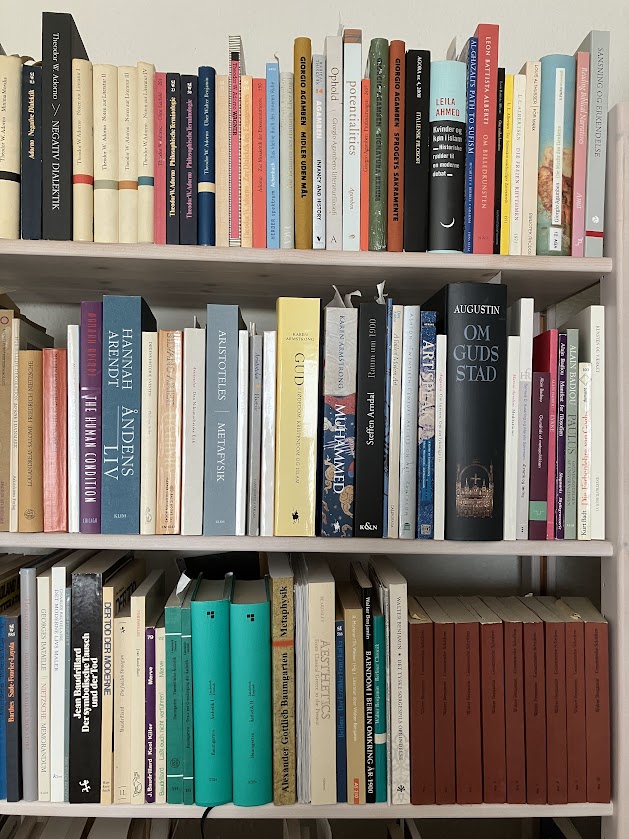
“Hvorfor begrænse sig til én ting, når virkeligheden er kompleks? Hvorfor ikke nærme sig kompleksiteten med udvidet tænkning?
Why limit oneself to one thing, when reality is complex? Why not approach complexity through expanded thinking?”
Dorthe Jørgensen
Dansk
Dorthe Jørgensens portfølje er omfattende og svær at beskrive med få ord. Hendes primære fagområder og discipliner inkluder imidlertid følgende:
Idéhistorie
De æstetiske idéers historie; de religiøse idéers historie; de filosofiske idéers historie; de sociale idéers historie; de pædagogiske idéers historie; de politiske idéers historie.
Historiefilosofi og idéhistoriografi; idéhistorisk metode; idéhistories historie, også som en tradition i dansk forskning; forholdet mellem filosofi og idéhistorie.
Den filosofiske og idéhistoriske tænkemådes samfundsmæssige betydning (dens betydning for forskellige kulturområder og for forståelsen af kultur og samfund som helhed) og vigtigheden af dansk som forskningssprog.
Teologi
Systematisk teologi (religionsfilosofi; forholdet mellem filosofi og teologi; teologisk æstetik og æstetisk teologi; poetisk teologi, narrativ teologi og erfaringsteologi; den fornemmende erfarings, fantasiens og den skønne tænknings betydning for teologien; den teologiske tænknings relevans og aktualitet).
Praktisk teologi (religionsæstetik, herunder forholdet mellem kunst og kristendom; æstetikkens, fænomenologiens og erfaringsmetafysikkens praktisk teologiske [f.eks. etiske og homiletiske] implikationer; bøn, tro, tænkning og æstetisk-sensitiv dannelse; prædikenskrivning som en kunst og den filosofiske og litterære essayskrivnings relevans).
Filosofi
Teoretisk filosofi (metafysik, metafysikkritik, erfaringsmetafysik; moderne og ældre erkendelses- og erfaringsteori, herunder filosofisk æstetik samt æstetikkens, fænomenologiens og erfaringsmetafysikkens etiske implikationer; skønhedsfilosofi, inklusive det sublime, det hæslige, osv.; teorier om sansning, fantasi og tænkning, herunder viden/visdom og skøn tænkning – fra antikken til i dag).
Kulturfilosofi (historiefilosofi; teorier om kunst, litteratur, musik, osv.; filosofisk pædagogik, dannelsesfilosofi (Bildung) og socialfilosofi; videnskabsfilosofi, herunder videnskabsæstetik; teorier om filosofisk fremstilling (Darstellung), herunder filosofi om essayet som form; æstetikkens, fænomenologiens og erfaringsmetafysikkens praktisk-politiske implikationer).
Filosofihistorie (klassisk tysk filosofi [Baumgarten, Kant, Hegel, Schlegel, idealisme, tidlig romantik]; fænomenologi og hermeneutik [Heidegger, Gadamer, Vattimo, Chrétien]; kritisk teori [Benjamin, Adorno, Habermas]; teorier om kunst og skønhed fra antikken til i dag; ældre såvel som moderne teorier om [forholdet mellem] idé og fænomen).
English
Dorthe Jørgensen’s portfolio is extensive and difficult to describe in a few words. However, her primary areas of expertise and disciplines include the following:
History of Ideas
The history of aesthetic ideas; the history of religious ideas; the history of philosophical ideas; the history of social ideas; the history of educational ideas; the history of political ideas.
The philosophy of history and idea-historiography; the method of the history of ideas; the history of the history of ideas, also as a tradition in Danish research; the relation between philosophy and the history of ideas.
The importance for society of the philosophical and idea-historical way of thinking (its importance for various cultural fields and for the understanding of culture and society as totalities), as well as the importance of Danish as research language.
Theology
Systematic theology (philosophy of religion; the relation between philosophy and theology; theological aesthetics and aesthetic theology; poetic theology, narrative theology and the theology of experience; the importance for theology of sensate experience, imagination, and beautiful thinking; the relevance and actuality of theological thought).
Practical theology (aesthetics of religion, including the relation between art and Christianity; the practical-theological [e.g., ethical and homilethical] implications of aesthetics, phenomenology, and the metaphysics of experience; prayer, faith, thinking, and aesthetic-sensitive formation; sermon writing as an art and the relevance of philosophical and literary essay writing).
Philosophy
Theoretical philosophy (metaphysics, the critique of metaphysics, metaphysics of experience; modern and ancient epistemology and theory of experience, including philosophical aesthetics and the ethical implications of aesthetics, phenomenology, and the metaphysics of experience; philosophy of beauty, including the sublime, the ugly, etc.; theories of sense, imagination and thinking, including knowledge/wisdom and beautiful –from the antiquity to our day).
Philosophy of culture (the philosophy of history; theories about art, literature, music, etc.; philosophical pedagogy, philosophy of formation (Bildung), and social philosophy; philosophy of science, including aesthetics of science; theories of philosophical presentation (Darstellung), including the philosophy of the essay as form; the practical-political implications of aesthetics, phenomenology, and the metaphysics of experience).
History of philosophy (classical German philosophy [Baumgarten, Kant, Hegel, Schlegel, idealism, early romanticism]; phenomenology and hermeneutics [Heidegger, Gadamer, Vattimo, Chrétien]; critical theory [Benjamin, Adorno, Habermas]; theories of art and beauty from the antiquity to our day; ancient as well as modern theories of [the relation between] idea and phenomenon).